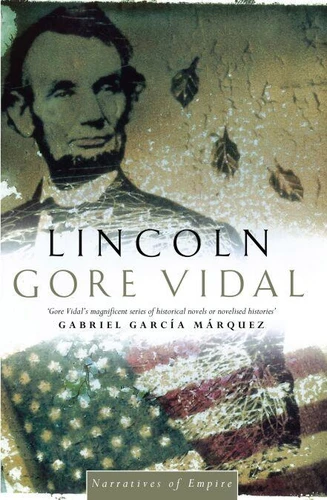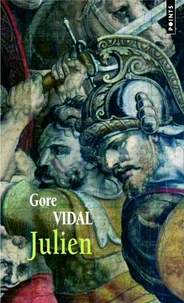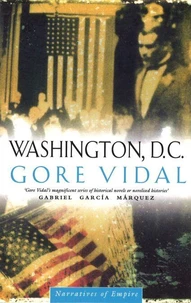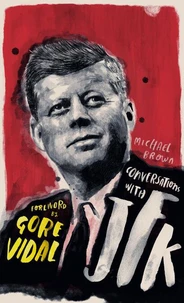Enfant terrible de la littérature américaine contemporaine, Gore Vidal, né le 3 octobre 1925, a une vingtaine dessais à son actif, mais aussi six pièces de théâtre et environ vingt-cinq romans. Il a débuté sa carrière dans les années 1950 en écrivant beaucoup pour la télévision et le cinéma, avant de se consacrer pleinement à la littérature. Cest avec « Un garçon près de la rivière » paru en 1948 qu'il se fait connaître car il ose aborder ouvertement le thème de lhomosexualité dans une Amérique encore bien puritaine. Depuis il est surtout connu pour ses grandes fresques historiques : « Julien » en 2006, « Empire » en 2008 ou « Lincoln » en 2010. Il ne faut pas passer à côté de « Palimpseste » paru en 2006, dans lequel il dresse une superbe galerie de portraits des personnalités quil a croisées dans la première partie de sa longue vie, et quil complète en 2008 par un deuxième tome « A lestime ».
Lincoln
Par :Formats :
Disponible d'occasion :
Disponible dans votre compte client Decitre ou Furet du Nord dès validation de votre commande. Le format ePub protégé est :
- Compatible avec une lecture sur My Vivlio (smartphone, tablette, ordinateur)
- Compatible avec une lecture sur liseuses Vivlio
- Pour les liseuses autres que Vivlio, vous devez utiliser le logiciel Adobe Digital Edition. Non compatible avec la lecture sur les liseuses Kindle, Remarkable et Sony
- Non compatible avec un achat hors France métropolitaine
 , qui est-ce ?
, qui est-ce ?Notre partenaire de plateforme de lecture numérique où vous retrouverez l'ensemble de vos ebooks gratuitement
Pour en savoir plus sur nos ebooks, consultez notre aide en ligne ici
- Nombre de pages736
- FormatePub
- ISBN978-0-349-14840-3
- EAN9780349148403
- Date de parution31/07/2025
- Protection num.Adobe DRM
- Infos supplémentairesepub
- ÉditeurAbacus
Résumé
In the hazardous fictional terrain of his historical novels, Gore Vidal is never especially kind to American history in general, or to its icons in particular. Yet in this brilliantly realised study of Abraham Lincoln, he paints a surprising and near-heroic picture of the man who led America through four of the most divisive and dangerous years of the nation's history. Observed alternately by his loved ones, his rivals and his future assassins, Lincoln at first appears as an inept and naïve backwoods lawyer.
People in this novel are not averse to turning up, getting drunk, and regaling the reader with details of Lincoln's whoring activities and his seemingly inexhaustible supply of folksy stories. Yet gradually Lincoln the towering leader of deep vision emerges in a Washington engulfed by fear, greed and the horrors of the Civil War. Lincoln's loving but mentally decomposing wife, his view from the White House on slavery and America's bloodiest war, and his own, fierce personal ambition: all are portrayed with a vibrancy and an urgency that almost belies what they have now become ? history itself.
People in this novel are not averse to turning up, getting drunk, and regaling the reader with details of Lincoln's whoring activities and his seemingly inexhaustible supply of folksy stories. Yet gradually Lincoln the towering leader of deep vision emerges in a Washington engulfed by fear, greed and the horrors of the Civil War. Lincoln's loving but mentally decomposing wife, his view from the White House on slavery and America's bloodiest war, and his own, fierce personal ambition: all are portrayed with a vibrancy and an urgency that almost belies what they have now become ? history itself.
In the hazardous fictional terrain of his historical novels, Gore Vidal is never especially kind to American history in general, or to its icons in particular. Yet in this brilliantly realised study of Abraham Lincoln, he paints a surprising and near-heroic picture of the man who led America through four of the most divisive and dangerous years of the nation's history. Observed alternately by his loved ones, his rivals and his future assassins, Lincoln at first appears as an inept and naïve backwoods lawyer.
People in this novel are not averse to turning up, getting drunk, and regaling the reader with details of Lincoln's whoring activities and his seemingly inexhaustible supply of folksy stories. Yet gradually Lincoln the towering leader of deep vision emerges in a Washington engulfed by fear, greed and the horrors of the Civil War. Lincoln's loving but mentally decomposing wife, his view from the White House on slavery and America's bloodiest war, and his own, fierce personal ambition: all are portrayed with a vibrancy and an urgency that almost belies what they have now become ? history itself.
People in this novel are not averse to turning up, getting drunk, and regaling the reader with details of Lincoln's whoring activities and his seemingly inexhaustible supply of folksy stories. Yet gradually Lincoln the towering leader of deep vision emerges in a Washington engulfed by fear, greed and the horrors of the Civil War. Lincoln's loving but mentally decomposing wife, his view from the White House on slavery and America's bloodiest war, and his own, fierce personal ambition: all are portrayed with a vibrancy and an urgency that almost belies what they have now become ? history itself.



















